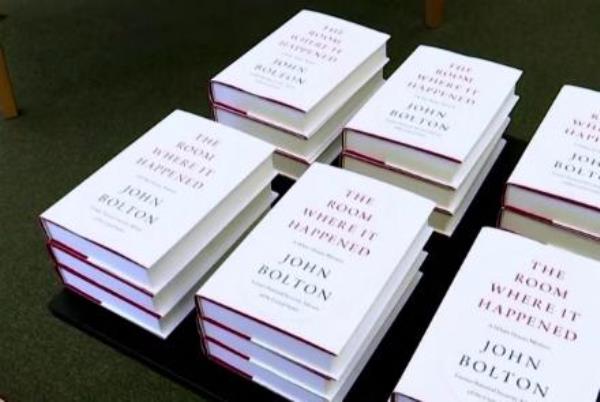Ex-National Security Adviser John Bolton’s book officially came out on Tuesday after passing a security review and a legal challenge from the US Justice Department.
On Saturday, a US federal judge ruled that Simon & Schuster, a unit of ViacomCBS Inc., could publish the book despite criticism from the Trump administration.
“The Room Where It Happened” was originally scheduled for March, but was delayed twice as the White House reviewed the manuscript.
Bolton has mentioned Afghanistan 143 times in his book and President Ghani’s name 17 times but has said that Trump was constantly confusing President Ashraf Ghani with former President Hamid Karzai.
“The fact that some small and large differences exist among them can be explained because Trump has a business mind–rather than being a political thinker,” said Nabi Misdaq, a presidential adviser.
President Trump and other members of the administration have called John Bolton a liar, while at the same they tried to stop his book from being published because it contained “classified” information. In a tweet on June 18, Trump wrote:
The book portrays Trump as frustrated with the war in Afghanistan.
Bolton writes that in a meeting with Trump and key US officials in the Oval Office in November, when Trump was talking about Afghanistan, he said that “it’s (referring to the Afghan war) a horror show. At some point, we’ve got to get out.”
Bolton quotes Trump as saying: “We’ll never get out. This was done by a stupid person named George Bush,” and “Millions of people killed, trillions of dollars, and we just can’t do it. Another six months, that’s what they said before, and we’re still getting our asses kicked.”
In this book, Mr. Bolton has talked about various aspects of politics including Trump’s foreign policy and his vision towards Afghanistan.
Bolton writes that Trump is not familiar with the Afghan president Ashraf Ghani. Ghani once said that he had one of the best relations with Trump.
In another place, Bolton writes: “On the morning of March 15, Trump called Ethiopian President Abiy Ahmed Ali (who became the 2019 Nobel Peace Prize winner in October) to express condolences for the recent Ethiopian Air crash (leading to the worldwide grounding of all Boeing 737 Max airplanes). While Trump and I were talking, waiting for the call to go through, he raised Afghanistan and said, ‘We’ve got to get out of there.’ It was not an auspicious way to start the day. I called him back after the Abiy call to explain that the briefing would largely consist of the Pentagon’s showing how it had redefined the Afghan mission based on his instructions to reduce the US presence. ‘It won’t hurt the negotiations, will it?’ he asked, worried that pulling down our numbers would indicate weakness, and I said it would not.”
Bolton also wrote: “In the Tank, Shanahan said the briefing would explain how to maintain our counterterrorism and other wherewithal now that the Taliban was negotiating. Trump immediately interrupted to ask, “Do we weaken our hand in the negotiations by saying we’re dropping our forces?” I had called both Shanahan and Pompeo right after my earlier exchange with Trump, and their answers were well prepared. They said the timing was actually perfect. As is often the case, decimating the opposition often makes the survivors more eager to negotiate. Trump then discoursed on how bad previous commanders had been (unfair, but a frequent complaint), not to mention Mattis’s performance, despite Trump’s having approved the rules of engagement Mattis requested. “How are the negotiations going?” Trump asked, but cut almost immediately into Pompeo’s response, raising the endemic corruption among Afghan officials, especially Afghan President Ghani and his purported riches, although unfortunately confusing Ghani with former President Hamid Karzai, as he did constantly. Hopefully unnoticed, I signaled Dunford to jump in to say that the reduction in violence accomplished by our current strategy meant we could fulfill our ongoing counterterrorism and other missions in practice with reduced resources, even without agreement from the Taliban. “We listened to you,” Dunford said to Trump, which was a good line in the post-Mattis era. Dunford also said we could handle any weakening of the Afghan government, if that occurred, and focus on al-Qaeda and ISIS, the real terrorist threats to America. I pointed out that weak central government was Afghanistan’s historical default position and would be nothing new for the inhabitants.”
From the 290 pages book, 14 pages are about Afghanistan.
“I have one of the best relations with the US president,” said Ghani last year during an interview with TOLOnews.
In the book, Bolton has also said that the US has faced a setback in the Afghan war because of Trump.
“The first issue is that Trump’s awareness of world affairs is very weak, for instance on one occasion, according to the book, he asked if Finland was part of Russia,” said Tariq Farhadi, former presidential adviser.













